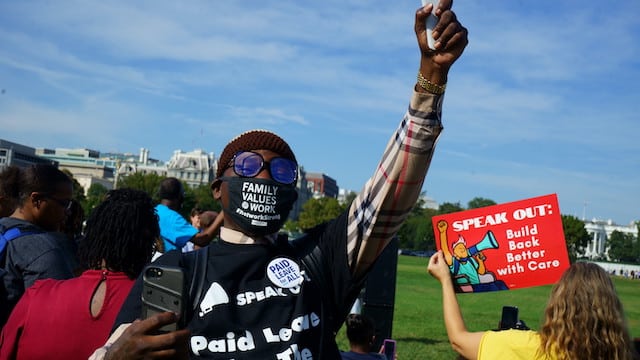FMLA 19 Years Later: Big Impact, Big Challenges

by Ellen Bravo
Nineteen years ago, an American president signed into law a measure that acknowledged for the first time that having a family shouldn’t cost you your job.
The bill was the Family and Medical Leave Act (FMLA), the president Bill Clinton, the date February 5, 1993. What the FMLA guarantees isn’t on a grand scale – eligible workers can take up to 12 weeks unpaid leave to care for themselves, a new child, or a seriously ill child, parent or married spouse.
What was grand was that those covered are guaranteed to have a job to come back to and continuation of health insurance while on leave, if their employer provided such insurance.
Since its implementation six months later, the FMLA has been used more than 100 million times. Women have been able to take time to heal from childbirth. Men and women have used it to bond with a newborn or newly adopted or foster child, recover or help a parent or kid recover from a serious illness, sit by the side of a child dying from cancer.
Back in 1993, activists who’d worked eight years for this reform celebrated wildly. Twice the bill had been vetoed by the first President Bush. We knew FMLA needed to be expanded –it covers only half the workforce, has an unrealistic definition of family, and is unaffordable for many. We continue to work to make those changes.
I was one of twelve people appointed by Congress in 1995 to a Commission to study the impact of the FMLA on employers and employees. We issued a major report showing that the bill had been a much needed relief to workers without being a burden to employers. And even though the Commission was evenly divided between those who’d worked to pass FMLA and those who’d tried to stop it, we unanimously agreed that more needed to be done and encouraged states to experiment with forms of family leave insurance to make the time affordable.
Progress for Families
Nearly two decades later, two states have finally done so – California and New Jersey – thanks to the work of broad coalitions. A third, Washington, has passed paid parental leave but implementation has been delayed. Look for a blog soon summarizing some exciting new reports and calls for action in this area.
As for the provisions of the FMLA itself, only minor adaptations have been made, almost all in the last two years. The most significant was ensuring use by family of military personnel who needed time off at the time of deployment or to care for an injured soldier. Just recently First Lady Michelle Obama announced proposed rulemaking for these new uses of FMLA, including one that would extend it for up to five years after a service member has left the military.
Same-sex partners who are not biological parents can now use FMLA to care for a new baby, thanks to an administrative interpretation by the Department of Labor last year that said they’re included in the phrase “in loco parentis” (in the place of a parent).
But those same-sex partners can not use FMLA to care for each other. Workers in firms under 50, or those who work less than 25 hours a week, or who need to care for a sibling or an extended family member, are also left out.
Attacks Continue
Instead of being expanded, FMLA has been under attack. The latest version is a case before the Supreme Court that will determine whether state employees can use the law to care for a personal illness or injury.
The legal issue involves states’ sovereign immunity from being sued in federal court for monetary damages.
But the real issue in Coleman v. Maryland Court of Appeals, boils down to this: does the FMLA cover Daniel Coleman — and millions of other state workers — when they use it to care not for a family member but for themselves?
Daniel Coleman, was working for a Maryland court when he became ill and his doctor ordered bed rest. Within hours of requesting leave, Coleman was fired. He filed a lawsuit alleging a violation of the FMLA. The lower courts agreed with his employer, the state of Maryland, that the state could not be sued for monetary damages under the FMLA’s self-care provision.
Eight years ago, the state of Nevada made a similar argument when an employee named William Hibbs was fired after taking FMLA leave to care for his ailing wife. The Supreme Court in that case ruled that FMLA was enacted by Congress under its Fourteenth Amendment power to address unconstitutional discrimination, and does cover states in the area of family care.
Having to fight this battle all over again over the self-care provision is outrageous. Let’s hope that the justices get it right, so that the millions of state employees in this country don’t have to worry that following doctor’s orders could cost them their job.
In the meantime, our coalitions will keep working hard to make sure that this protection applies to all workers.